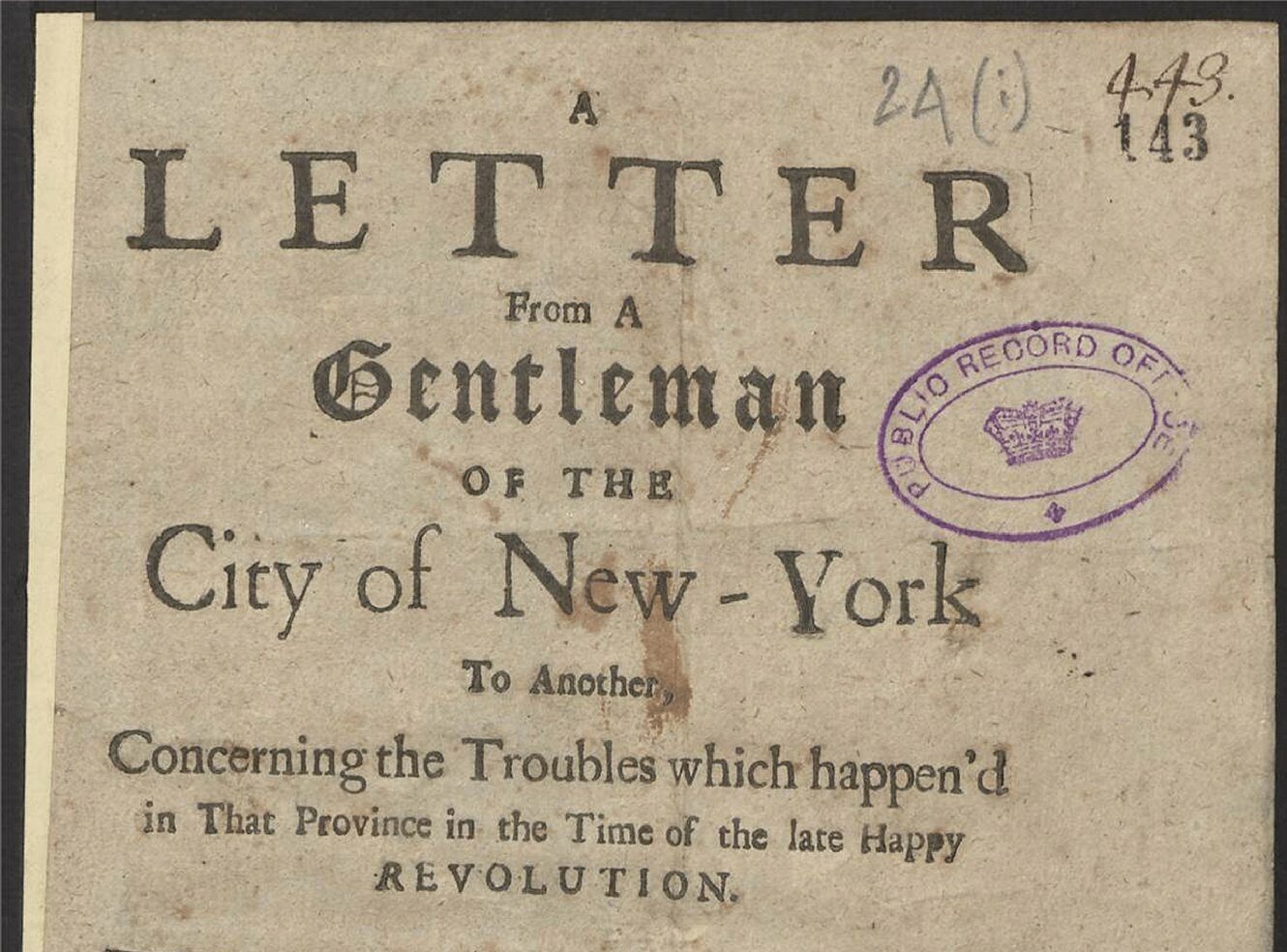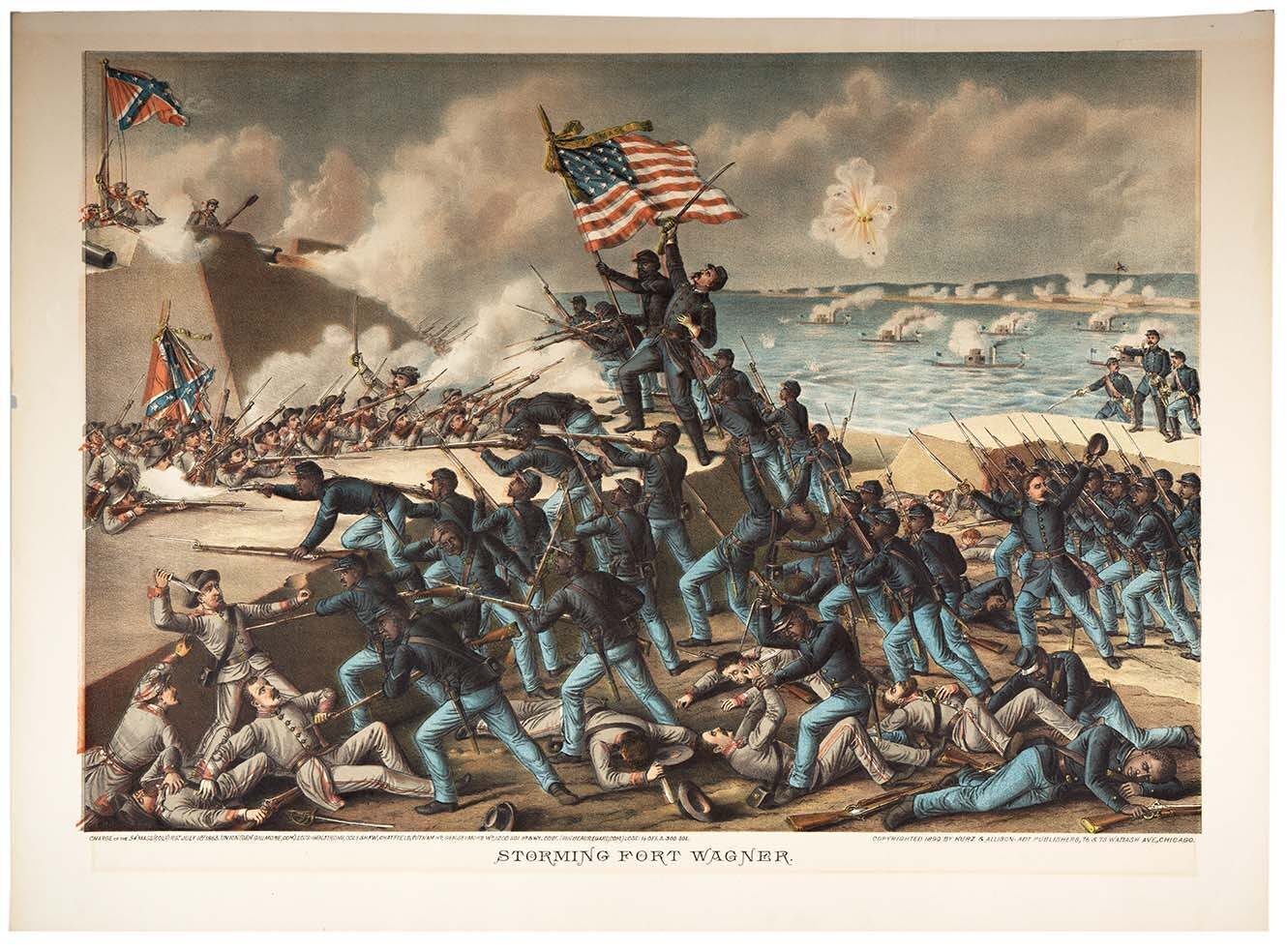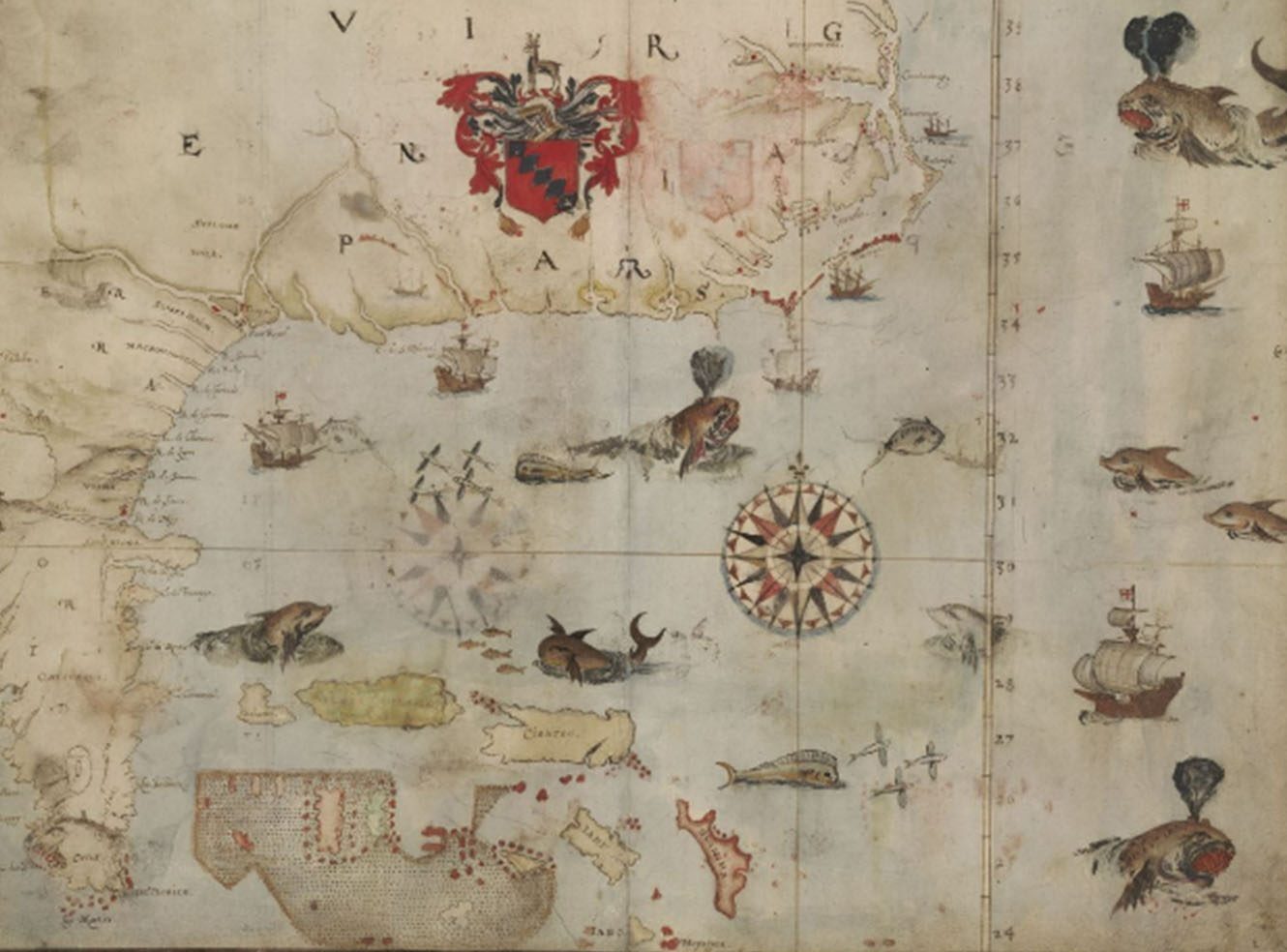Colonial America
Complete CO 5 files from The National Archives, UK, 1606-1822
A 'game changing' development for historians and researchers of early America providing access to a vast archive of 70,000 manuscript documents.
Sourced from The National Archives UK, Colonial America offers access to thousands of documents on North America from 1606-1822. Described as an ‘indispensable’ resource for researchers of the early-modern Atlantic world, it was the winner of Library Journal’s Best Reference Award, and the CHOICE Academic Title of 2018 and 2020.
Colonial America offers transformative research possibilities with full-text searching across all manuscript documents using Handwritten Text Recognition (HTR). HTR is a ground-breaking search technology utilising artificial intelligence to deliver document level full-text search results in manuscript material.
The HTR application uses complex algorithms and artificial intelligence to determine possible combinations of characters in handwritten documents, allowing users to easily navigate between highlighted search results.
Highlights
- Charters and commissions relating to the foundation and government of Virginia, Massachusetts, Connecticut, Rhode Island, Maryland and Pennsylvania
- Comprehensive volumes of local legislation running from the colonies' dates of foundation
- Abstracts of grants of land in New York in the years after the English takeover from the Dutch
- Major Peter Schuyler's holograph journal of his expedition to Canada and action against the French at the Battle of La Prairie during King William's War (1691)
- George Washington's account of a military mission to French defences on the Ohio river during the French and Indian War (1753-54)
- Reports on prominent Indian figures during Pontiac's Rebellion (1760-64)
- Material on the settlement of 'Palatines' (German) in New York, settled in exchange for their labour in the production of naval stores (1710-12)
- Council proceedings discussing the dispersal of French Protestant refugees (Huguenots) through the English colonies (1695) and grants of land to Huguenot women on the islands of St Kitts (1715)
- Acts of the South Carolina assembly relating to Acadians expelled from Nova Scotia (1756)
- Instructions to Edmund Andros, governor of the short-lived Dominion of New England (1686-89), deposed in the Glorious Revolution
- Pamphlets both supporting and opposing Jacob Leisler, leader of the rebellion against the government of New York (1689-91)
- Correspondence on the 'Narrangansett Country' or 'King's Province' (Washington Country, Rhode Island), subject of a long-running boundary dispute between four colonies from the 1650s to 1726
- Shipping returns, listing the details of each ship in colonial ports and the type and amount of goods carried
- Petititons originating in various colonies for and against the continued imposition of the Navigation Acts
- Legal material stemming from the Boston Tea Party (1774-81)
- Relations and negotiations with allied Indian tribes (1776-83)
- Military correspondence between British generals in America and the Secretary of State (1776-84)
- Intercepted Patriot correspondence (1776-83).
Modules include
| Module | Summary | Date |
|---|---|---|
| Module I: Early Settlement, Expansion and Rivalries |
The first module of Colonial America documents the early history of the colonies, and includes founding charters, material on the effects of 1688’s Glorious Revolution in North America, records of piracy and seaborne rivalry with the French and Spanish, and copious military material from the French and Indian War of 1754-63. |
1688-1763 |
| Module II: Towards Revolution |
Focusing on the 1760s and 1770s, this module covers the social and political unrest that led to the Declaration of Independence, including legal materials covering the aftermath of the Boston Tea Party. It is also particularly rich in material relating to military affairs and Indigenous Americans. |
1760-1770 |
| Module III: The American Revolution |
This module charts the upheavals of the 1770s and 1780s which saw the throwing off of British rule in the Thirteen Colonies. Contents include volumes of intercepted letters between colonists, the military correspondence of the British commanders in the field, and material produced by the Ordnance Office and the office of the Secretary at War, as well as two copies of the ‘Dunlap’ edition of the Declaration of Independence printed on the night of the 4-5 July 1776. |
1770-1780 |
| Module IV: Legislation and Politics in the Colonies |
This module traces the colonies' legal and political evolution between 1636-1782. Copies of council and assembly minutes record debates on international politics, including Britain’s wars with Spain, expeditions against the French in Canada, and trade regulations. Court journals also trace legal cases and trials heard in the colonies, whilst a series of official correspondence and revisions of acts reveal attempts to increase the jurisdiction of British officials in the colonies, expand settlement, and improve public facilities and trade. The extensive revisions and annotations of these documents also expose the internal (and often personal) political agendas of their creators. |
1636-1782 |
| Module V: Growth, Trade and Development |
The preponderant part of the final module consists of correspondence between officials in the colonies and government bodies in London. There are also details of land grants, shipping returns and financial accounts, as well as George Vancouver’s despatches to London from his 1791-1795 expedition to the Pacific Northwest. The shipping returns reveal a trade network focusing on internal trade within the American colonies and the Caribbean, and with frequent connections across Europe. |
1625-1801 |
Key data
Period covered
Source archive
- The National Archives, UK
- Beginning and expansion of English settlement
- The development of colonial institutions
- Colonial legislation
- Education
- Economic development
- Settlers' relationships with Native Americans
- English/British relations with the Dutch, French and Spanish
- Trade and protectionism
- Taxation
- Militias, garrisons and military preparedness
- Warfare
- Alliances and diplomacy
- Peace negotiations
- Naval matters
- Piracy and privateering
- Tobacco, sugar and other commodities
- Religious matters
- Slavery and the slave trade
- Immigration from Britain and elsewhere in Europe
- Surveying and exploration
- Relations between the colonial and British governments
- The Glorious Revolution
- Political protest and unrest
- The American Revolution
- Correspondence
- Charters and commissions
- Orders
- Court records
- Land grants and associated documents
- Maps and building plans
- Diaries
- Newspapers
- Printed pamphlets, broadsides and speeches
- Legislation
- Military documents
- Petitions
- Public notices and proclamations
- Financial documents
- Shipping returns
- Max Edelson, University of Virginia
- Craig Gallagher, Boston College
- Patrick Griffin, Notre Dame University
- Tim Lockley, University of Warwick
- James Sidbury, Rice University
- David J. Silverman, George Washington University
- Mark Spencer, Brock University
- Richard Stone, University of Bristol
- Neil York, Brigham Young University
- Colin Nicolson, University of Stirling
- Ben Marsh, University of Kent
- Hannah Tucker, University of Virginia
- Business and Economics
- Communities, Peoples and Nations
- European Studies
- North American Studies
- Handwritten Text Recognition (HTR) delivering document level full-text search results across all handwritten manuscript documents
- Comprehensive compilation of metadata for manuscript documents ensuring maximum searchability and ease of access for researchers
- Essays by leading academics to explore and contextualise the original material
- Map gallery showcasing extensive collection of colour maps associated with the material
Collection insights
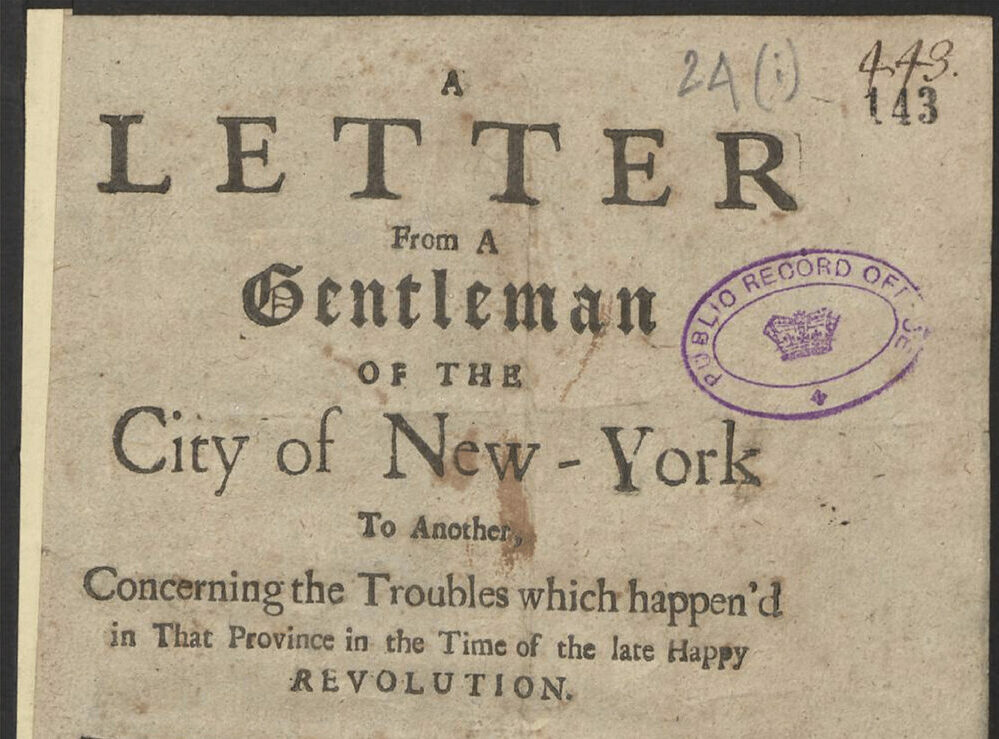
Professor Jessica Stern, Professor of History at California State University, Fullerton shared her experiences teaching with AM's collection Colonial America and the impact it had on the students.
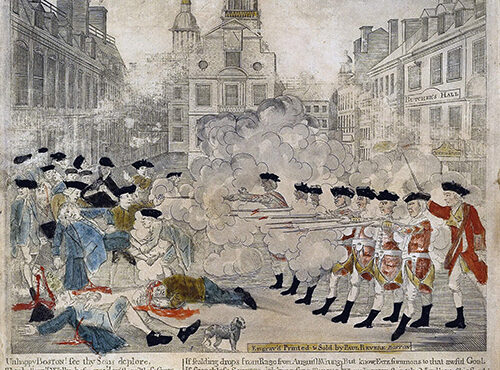
On the evening of 5th March 1770, in a snowy Boston, eight British soldiers led by Captain Thomas Preston confronted a crowd of Bostonians, who had gathered to protest outside the Custom House. Ignoring Preston’s command to disperse, the angry mob closed around, throwing snowballs and oyster shells at them.
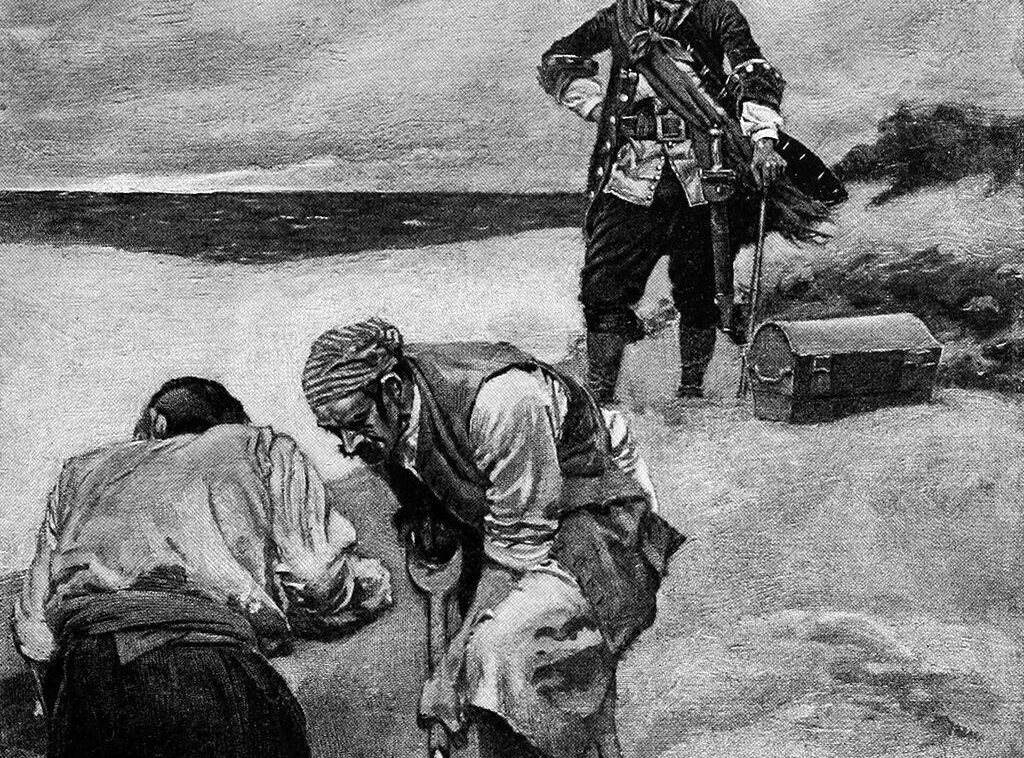
Reviews
Remarkable, multi-layered product
- Author: Cheryl LaGuardia
- Publisher: Library Journal
This unique scholarly resource is suitable for academic institutions that support researchers working in seventeenth- and eighteenth-century American history.
- Author: Rebecca Vnuk
- Publisher: The Booklist
This resource is a treasure for scholars
- Author: Kay Leeman
- Publisher: Reference Books Annual
Significant value to researchers at all levels
- Author: R. J. Erlandson
- Publisher: CHOICE
Highly recommended to historians, professors, and scholars of the colonial American period
- Author: Janis Minshull
- Publisher: American Reference Books Annual
Highly recommended. Beginning students through researchers/faculty; professionals/practitioners.
- Author: R. J. Erlandson, independent scholar
- Publisher: CHOICE
Adam Matthew assumes a leading position in eighteenth-century studies with Colonial America
- Author: Norman Desmarais, Professor Emeritus, Providence College
- Publisher: Reference Reviews
The release of documents in The American Revolution collection opens the door to a wealth of new primary research material
- Author: R. J. Erlandson, Independent consultant
- Publisher: CHOICE
Essential. Lower-division undergraduates through faculty.
- Author: Jason Martin, Walker Library, Middle Tennessee State University
- Publisher: CHOICE
Supporting material
Videos
What are the CO5 Files?
The National Archives: Digitising The Past
Webinar: Early American History and the New Digital Archive Featuring Guest Speakers
Product Overview: Colonial America
Scholars and Librarians Discuss the Impact of Handwritten Text Recognition (HTR): Available in Colonial America
A Demonstration of Handwritten Text Recognition: A Revolution in Manuscript Research

